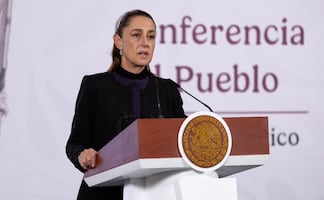Más Información

Narco “La Rana”, entre altar a la muerte, corridos de Los Rayos del Norte, drogas y armas doradas; EU difunde foto de como vivía

Sheinbaum ajusta horario de conferencia mañanera este 26 de febrero; se realizará desde Mazatlán, Sinaloa

Ellos son “La Rana” y “Aquiles”, hermanos Arzate-García, jefes del Cártel de Sinaloa; EU los busca por narcoterrorismo
The history of the Europe-United States relations has been a cornerstone in what is called the “liberal order” from the second half of the 20th century. As any relation, it has had its ups and downs: in 1952, the U.S. was the first non-member country to recognize the European Coal and Steel Community (ECSC), today the foundation of the European Union (EU). And when Henry Kissinger was the American Secretary of State, he criticized Europe's community construction.
In 1990, with the Transatlantic Declaration, the EU-US relations were formalized, while in the European Security Strategy of 2003 the U.S. was established as the “irreplaceable partner” of the EU. Although at that time, the invasion of Iraq promoted by the George W. Bush administration provoked a transatlantic and intra-European fracture.
During Barack Obama's administration, it seemed that the pro-American sentiment in Europe began to revive. However, with Donald Trump's arrival to the presidency, it appears that this relation is undergoing a crisis, given the events in his recent trip to Brussels.
In order to understand the current context, it is necessary to point out two main elements. First, it is important to know that the United States-Europe relations are not only ruled by the EU-US interactions, but the role of the North Atlantic Treaty Organization (NATO) and the international structure per se condition their development. It is no coincidence that Trump's first trip to Europe was to attend the NATO summit.
It is often argued that the American internationalism began with Europe. The NATO acted for Europeans as a great security and defense shield during the Cold War. And one of the first isolationist critics Trump made was towards said organization. That is why the words of the Chancellor of Germany, Angela Merkel, became relevant: “We Europeans truly have to take our fate into our own hands.”
More than the lack of participation in anti-terrorist combat by the reluctance of some members or the absence of American manifestation about the compromise with the collective defense principle acknowledged in the Article 5 of the NATO, the Chancellor of Germany's words were oriented towards the second element that needs to be remarked: in the current global scenario, Trump's declarations and actions position him closer to the Euro-scepticism of the departure of the United Kingdom from the EU (Brexit) and the isolationism of the European far right.
In this sense, Trump's speech is closer to the populist leaders of Europe with respect to the return to nationalism, protectionism, and the construction of the idea of the link between migration and terrorism.
Taking all that as a pretext, Trump disregarded his European partners as a block in the way he pointed out the budget deficiencies of the NATO, by ignoring the invitations of the rest of the G7 to not leave the Paris Agreement, as well as by neglecting his work meeting with the 2 Presidents of the EU, Donald Tusk of the European Council and Jean Claude Juncker of the European Commission, with whom he was to discuss the Transatlantic Trade and Investment Partnership (TTIP). Instead, Trump showed his bilateral preference with the meeting held with the new French President, Emmanuel Macron.
Nevertheless, Macron arrived at the Presidency with a liberal, cosmopolitan and Europeanist agenda which has found acceptance in the office of the Chancellor of Germany. In a context where the United Kingdom has chosen Brexit, the understanding Macron-Merkel (M&M) would reactivate the Paris-Berlin axis as motor of the European project against the Euro-hostile populism.
Were this European alliance reinforce once again, in an international landscape of uncertainty and multipolar structure, the European Union must take advantage of the opportunity to spread its political-economic capacities in order to have a more active role in all those efforts that require multilateral cooperation with the goal of reaching global benefits.
Internationalist by the National Autonomous University of Mexico and Master by the Autonomous University of Barcelona.
Specialist in European Integration.
agarciag@comunidad.unam.mx
mr
Noticias según tus intereses
[Publicidad]
[Publicidad]











